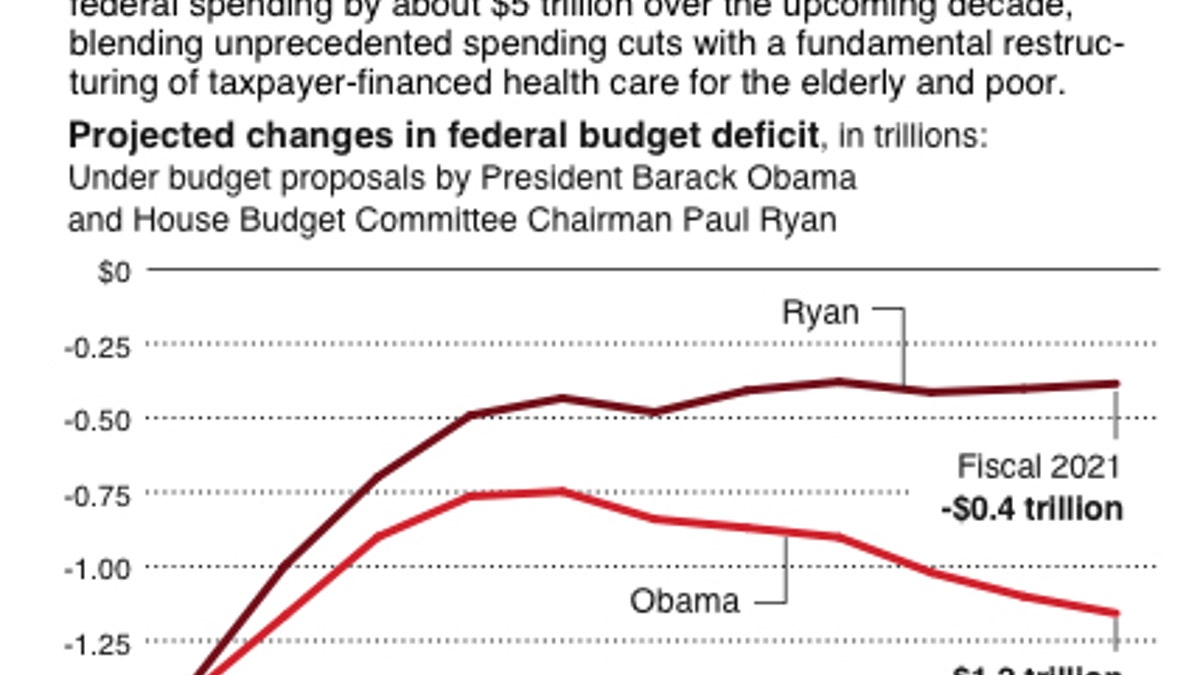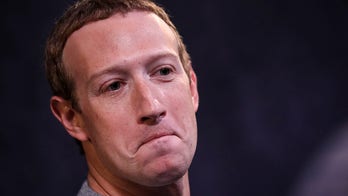
Graphic shows President Barack Obama and House Budget Committee Chairman Paul Ryan projected budget deficit for fiscal years 2011-2021. (AP)
Even though Congress is still locked in a showdown over this year's budget, House Republicans have already begun to push for passage of their proposal for next year's budget -- a proposal that supporters say will check the nation's spending binge, while critics describe it as an assault on the elderly and the poor.
The sweeping $3.5 trillion federal budget blueprint by House Budget Chairman Paul Ryan, R-Wis., lays the groundwork for a decade of cuts in spending, taxes and deficits. It would be tempered by a shift of costs to future retirees and features a reshaping of the government's two chief health care programs for the elderly and poor, Medicare and Medicaid.
Though the blueprint covers the entire reach of government, much of Wednesday's House Budget Committee debate focused on health and other social programs, from which Republicans were proposing to wring hundreds of billions in savings over the next 10 years. Ryan said that with sky-high deficits, the government needs to limit its mission to programs that are truly needed.
"We don't want to turn the safety net into a hammock that lulls people to lives of complacencies and dependencies, into a permanent condition where they never get on their feet," he said.
Rep. Chris Van Hollen of Maryland, the panel's top Democrat, said Republicans are protecting tax breaks for corporations and the wealthy at the expense of the middle class and the poor. The Republican budget proposes whittling the current 35 percent top tax rate on individuals and businesses to 25 percent.
"It doesn't reform Medicare, it deforms and dismantles it," Van Hollen said of the GOP's budget. As for Medicaid, the budget "rips apart the safety net" for poor and older people, he added.
The proposal is a non-binding road map whose taxing and spending changes are supposed to be enacted later in the year in future legislation. But Ryan's plan has no chance of being approved by the Democratic-run Senate, making it more of a statement of priorities that candidates are likely to embrace or attack during the 2012 campaigns.
As committee debate extended into the afternoon, Republicans batted down a parade of Democratic amendments that, like the budget itself, were designed to underscore political points. By party-line votes, the panel rejected one amendment blocking tax cuts for millionaires and another rejecting reductions in Medicaid benefits for elderly nursing home residents.
"It's unconscionable that Republicans are abandoning our seniors, including our sickest and most frail seniors, for a political cause" of reducing the size of government, Rep. Allyson Schwartz, D-Pa., said.
Republicans castigated Democrats for trying to curb the blueprint's tax cuts, saying today's level of taxes and regulation make it harder for businesses to create jobs.
"Why don't you guys like small-business people?" asked Rep. Ken Calvert, R-Calif.
Liberal lawmakers bashed Ryan's proposal Wednesday as declaring war on the elderly and the poor.
"It is a disgrace to allow insurance companies to make more on the backs of seniors," Rep. Barbara Lee, D-Calif., said.
But Ryan says his plan will save the health programs for the elderly and poor.
"We're saving Medicare, we're saving Medicaid and we're getting the debt paid off," he told Fox News.
White House spokesman Jay Carney made clear the president isn't a fan of Ryan's plan.
"Any program or plan that reduces our deficit must reflect American values of fairness and shared sacrifice," he said. "Ryan's plan fails this. It cuts taxes for millionaires and special interest while putting a greater burden on seniors, families struggling with children's disabilities and students who count on Pell grants."
But Ryan disputed that description.
"We repair the social safety net. And when it comes to taxes, we get rid of all these loopholes and deductions, which is what mostly wealthy people lose and lowering taxes as a consequence to get economic growth in this country."
The Associated Press contributed to this report.




